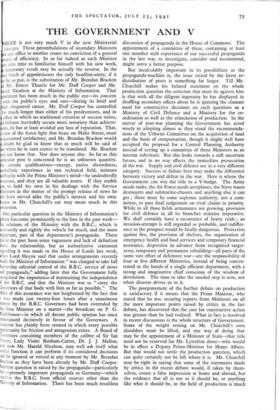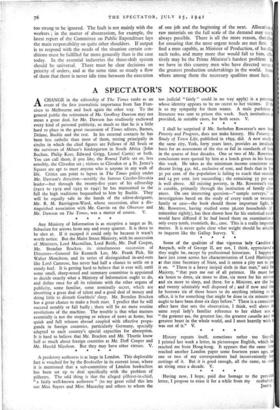THE GOVERNMENT AND V
HERE is not very much V in the new Ministerial changes. These perambulations of secondary Ministers one office to another create no conviction of a general ease of efficiency. In so far indeed as each Minister St take time to familiarise himself with his new work, temporary result may be actually the reverse. In the st batch of appointments the only headline-entry, if it v be so put, is the substitution of Mr. Brendan Bracken Mr. Ernest Thurtle for Mr. Duff Cooper and Mr.
told Nicolson at the Ministry of Information. That ailment has been much in the public eye—its concern with the public's eyes and ears—during its brief and er chequered career. Mr. Duff Cooper has controlled for much longer than either of his predecessors, and in office in which no traditional criterion of success exists, d failures inevitably secure more notoriety than achieve- nts, he has at least avoided any loss of reputation. That, view of the fierce light that beats on Malet Street, must accounted satisfactory, and Mr. Brendan Bracken would doubt be glad to know that as much will be said of when he in turn comes to be translated. Mr. Bracken es not know that. Nor does anyone else. So far as this 'cular post is concerned he is an unknown quantity. t certain qualifications—energy, native shrewdness, urnalistic experience in one technical field, intimate iliarity with the Prime Minister's mind—he undoubtedly ssesses, and they are all valuable assets. If they enable m to hold his own in his dealings with the Service inisters in the matter of the prompt release of news he ill have served alike the public's interest and his own. ccess to Mr. Churchill's ear may mean much in this nnexion.
One particular question in the Ministry of Information's here has come prominently to the fore in the past week— e relations of the Ministry with the B.B.C., which is ecessarily and rightly the vehicle for much, and the more portant, part of that department's propaganda. There as in the past been some vagueness and lack of definition bout the relationship, but an authoritative statement egarding it was made in the House of Lords last week, hen Lord Moyne said that under arrangements recently ade the Minister of Information "was charged to take full lay-to-day editorial control of the B.B.C. service of news tad propaganda," adding later that the Government fully .ecognised the importance of maintaining the independence )f the B.B.C. and that the Minister was to "carry the 3overnors of that body with him as far as possible." The :flea of this assurance was not heightened by the fact that t was made just twenty-four hours after a unanimous notest by the B.B.C. Governors had been overruled by he then Minister on a matter—the broadcast on P. G. rodehouse—in which all decent public opinion has since ronounced decisively in favour of the Governors. A iituation has plainly been created in which every possible vportunity for friction and antagonism exists. A Board of r3ovemors containing members of the calibre of Sir Ian Fraser, Lady Violet Bonham-Carter, Dr. J. J. Mallon, tad now Mr. Harold Nicolson, may well ask itself what useful function it can perform if its considered decisions :an be ignored or vetoed at any moment by Mr. Brendan Bracken as they have been already by Mr. Duff Cooper. knother question is raised by the propaganda—particularly the supremely important propaganda to Germany—which reaches the B.RC. from official sources other than the kinistry of Information. There has been much resultless discussion of propaganda in the House of Commons. The appointment of a committee of three, containing at least one member w,ith experience of our successful propaganda in the last war, to investigate, consider and recommend, might serve a better purpose.
But incalculably important in its possibilities as the propaganda-machine is, the issue raised by the latest re- distribution of posts is something far larger. Till Mr. Churchill makes his belated statement on the whole production question the criticism that must lie against him is that with all the diligent ingenuity he has displayed in shuffling secondary offices about he is ignoring the clamant need for constructive decisions on such questions as a Ministry of Civil Defence and a Ministry for the co- ordination as well as the stimulation of production. In the matter of post-war planning the Government has acted wisely in adopting almost as they stand the recommenda- tions of the Uthwatt Committee on the acquisition of land and the basis of compensation, though it might well have accepted the proposal for a Central Planning Authority instead of setting up a committee of three Ministers as an interim substitute. But this looks towards a still uncertain future, and in no way affects the immediate prosecution of the war. Supply and civil defence are in a very different category. Success or failure here may make the difference between victory and defeat in the war. Here is where the Government can win the title to a V-badge. The Army needs tanks, the Air Force needs aeroplanes, the Navy wants destroyers and submarine-chasers and anything else it can get ; there must be some supreme authority, not a com- mittee, to pass final judgement on rival claims to priority. While in all those fields armaments are growing, provision for civil defence in all its branches remains imperative. We shall certainly have a recurrence of heavy raids ; an invasion-attempt is still regarded as probable, and indiffer- ence to the prospect would be fatally dangerous. Protection against fire, the provision of shelters, the organisation of emergency health and food services and temporary financial assistance, dispersion in advance from recognised target- areas, temporary and permanent rebuilding—all parts of the same vast effort of defensive war—are the responsibility of four or five different Ministries, instead of being concen- trated in the hands of a single efficient department, with a strong and imaginative chief conscious of the wisdom of devolution. The time to take the needed step is now, not when disaster drives us to it.
The postponement of the further debate on production is satisfactory if it means that the Prime Minister, who stated that he was securing reports from Ministers on all the more important points raised by critics in the last debate, has discovered that the case for constructive action was greater than he had realised. What in fact is involved in recent discussions is the whole structure of Government. Some of the weight resting on Mr. Churchill's own shoulders must be lifted, and one way of doing that may be the appointment of a Minister of State—that title need not be reserved for Mr. Lyttelton alone—who would be in effect a Deputy Prime-Minister for Home Affairs. But that would not settle the production question, which can quite certainly not be left where it is. Mr. Churchill may be right in saying that some of the statements made by critics in the recent debate would, if taken by them- selves, create a false impression at home and abroad, but the evidence that all is not as it should be, or anything like what it should be, in the field of production is much too strong to be ignored. The fault is not mainly with the workers ; in the matter of absenteeism, for example, the latest report of the Committee on Public Expenditure lays the main responsibility on quite other shoulders. If output is to respond with the needs of the situation certain con- ditions must be fulfilled far more generally than is the case today. In the essential industries the three-shift system should be universal. There must be clear decisions on priority of orders, and at the same time so steady a flow of them that there is never idle time between the execution of one job and the beginning of the next. Allocation raw materials on the full scale of the demand may Lot always possible. There is all the more reason, therefo for ensuring that the most urgent needs are met first. T find a man capable, as Minister of Production, of hand such tasks, and many more that would fall to him, effec tively may be the Prime Minister's hardest problem. B we have in this country men who have directed some the greatest production undertakings in the world. So where among them the necessary qualities must lurk.



























 Previous page
Previous page